In the scheme of contemporary Bollywood potboilers, women have mostly been awarded the role of expensively-dressed mannequins, that is, when she's not being used as a prop to hone the hero's damsel-in-distress management skills. There have been exceptions over the years, but too few and not enough to topple the Hindi film industry's organized misogyny.
This year, however, a handful of filmmakers departed from the usual formula to write women characters that didn't have the shelf life of a Honey Singh party number. The interesting characters aside, the women who played these roles packed in performances that screamed for pithier roles for them in Bollywood.
![dolly ki doli]()
A promotional still from Dolly Ki Doli.
The year took off to a wobbly start with Abhishek Dogra's Dolly Ki Doli. Sonam Kapoor has had the special privilege of having films written around her in the past but she has had a difficult time making the titular characters either convincing or affable. However, with Dolly Ki Doli, she seemed to have made a dedicated effort to make her character at least likeable. The problem with Kapoor is that she never stops being Sonam Kapoor - the version we have seen in Koffee With Karan - or in any of her films. In Dogra's family she tried her best to shake off her Sonam Kapoorness to play a street smart thief who makes a living by conning men. Dolly Ki Doli's best was saved for the last, when the director refused to let his protagonist reform in the most Bollywood way possible - by getting married to the brave hero.
![dum laga ke haisha]()
Bhumi Pednekar in Dum Laga Ke Haisha.
Yashraj Films released its little-hyped Dum Laga Ki Haisha. Sharat Katariya's film broke new ground in mainstream Bollywood by writing a story around a plump woman - a size Bollywood had traditionally reserved for the heroine's simpleton friend, or for the badly-dressed woman who pines for the hero and hence is supposed to be comical or the reviling aunt. Fat was and continues to be synonymous with funny and the audience is urged to laugh at the 'fat woman's' basic urges - like dressing up, eating, or crushing on a guy.
However, Bhumi Pednekar embraced her character Sandhya's weight with such grace that she could be easily the most real woman character we have seen in ages in Bollywood. Pednekar and her character showed how average people with a few extra kilos actually live - with a great deal of confidence and a degree of dismissiveness about his/her body. Pednekar's Sandhya embodied that peace we have forged with our far-from-perfect bodies. She even showed how criticism against one's body need not be tolerated, never mind who it is from. Sandhya's character - reticent at times and mildly rebellious at others - is played wonderfully by newcomer Pednekar.
![nh10]()
Anushka Sharma in NH10.
Next came Anushka Sharma's NH10, a film she had produced. Sharma's film was raw and violent. Violence has been a mainstay in Bollywood films but women have been at the receiving end of it mostly to facilitate heroics from the leading man. Sharma's character Meera reacts to violence like one of us would - starting with fear, then desperation followed by blinding rage. Sharma, considered one of the most convincing actresses we have in the industry, essayed Meera's transformation with heart-aching accuracy. You could feel Meera anger on your fingertips and her pain as a growing lump in your throat.
Two films, that could have easily been written off as arthouse, actually managed to grab eyeballs after their release. One was Shonali Bose's Margarita, With A Straw, which had Kalki Koechlin playing Laila, the protagonist with autism. Though the film didn't exactly set the cash register ringing, it was one of the most important films of our times. Given how ill-equipped as a culture we are to deal with disability - off and on screen - Margarita, With A Straw is a thoughtful portrayal of people with autism. In fact, it managed to shock conservative cine-goers by its accurate portrayal of such an individual's sexuality and the challenges involved in leading a sexually satisfying life. And a major part of the credit for making the film look real went to Koechlin who delivered a restrained performance while playing a character which can look easily overwrought.
![masaan]()
Richa Chadha.
Neeraj Ghaywan's Masaan was one of the most memorable films of the year. And Richa Chaddha, who plays Devi, rightly walked away with all the accolades. Devi, a young woman who goes through a series of harrowing experiences that would break anyone, seems to possess a sense of equanimity.
Also, Devi is one of the few women characters written in Indian films who don't treat their sexuality as a shame, like most women. In the scene where Devi meets her paramour in a hotel, the sexual tension in the room could be cut with a knife. The protagonists, hesitate, teeter and finally embrace desire in the most awkward, real way. Devi grabs her lover's hands and places them on her breast, a far cry from how the industry is accustomed to portraying foreplay.
Devi is also a victim of patriarchy but she seems to have chosen to rise above it by just being herself, pursuing her dreams. It's difficult to like Devi, probably because we are conditioned to seeing a certain amount of vulnerability in our victims. Devi almost flinches away from showing any form of tenderness even to her valiant father who sticks by her through everything. However, the filmmaker ensures that as a survivor, she commands our utmost respect.
![tanu weds manu returns]()
Kangana Ranaut in Tanu Weds Manu Returns.
The throbbing excitement that preceded the release of Tanu Weds Manu Returns in May this year came with a reassuring message - that Indian audiences were finally warming up to the idea of a woman being the central character of the film. Bollywood potboilers which exist to sing paeans for the brave, macho Indian male have over the years conditioned film goers to seek out films starring a highly-billed male actor. Kangana Ranaut managed to breach that sacred space reserved for the Bollywood hero with Tanu Weds Manu Returns. Ranaut played the roles of a tomboyish Kusum and a dramatic, overtly feminine Tanu in the film. From her pitch-perfect Haryanvi accent to her comic timing, from her chameleon-like agility as she swapped characters to how she wholeheartedly embraced the oddities of Kusum and Tanu in the film, Ranaut was worth every paisa of the ticket price. In fact, with Tanu Weds Manu Returns, the idea that a 'Kangana Ranaut film' is worth investing in, has dug its heels in the conscience of the average Bollywood film-goer.
![piku]()
Deepika Padukone in Piku.
Vying for the same space in the Bollywood film lover's life is Deepika Padukone. The actor - who has come an unbelievably long way since her wooden Om Shanti Om days - had a fabulous year, with author-backed roles to boot. Shoojit Sircar's Piku, which released in May this year, was a testimony to Padukone's eye for nuance as she made a complicated, layered character her own. Piku was a bit of you, a bit of me, bits of many, many people you know. From vacillating between deep resentment and anxious affection for an ageing parent, to looking away from the gaping blanks in her life, Piku was so real that she was almost heartbreaking. And the credit goes entirely to Padukone.
In Tamasha, Padukone managed to lend coherence to the character of Tara - a girl who is disappointed, but cannot fall out of love. Tara's dichotomy - her love for Ved (Ranbir Kapoor) and her inability to embrace the man as he is - is played out by Padukone with coherence and confidence. The year concluded with Padukone playing Mastani in Sanjay Leela Bhansali's Bajirao Mastani. Overtly dramatic, like most of Bhansali characters, Padukone still managed to lend Mastani a semblance of realism.
![]() Like Us On Facebook |
Like Us On Facebook |
![]() Follow Us On Twitter |
Follow Us On Twitter |
![]() Contact HuffPost India
Contact HuffPost India
Also see on HuffPost:
This year, however, a handful of filmmakers departed from the usual formula to write women characters that didn't have the shelf life of a Honey Singh party number. The interesting characters aside, the women who played these roles packed in performances that screamed for pithier roles for them in Bollywood.
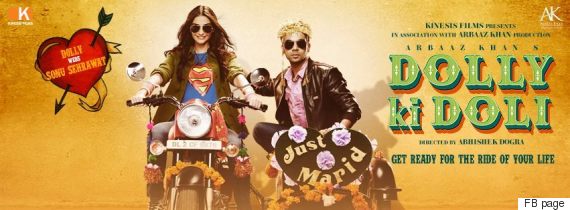
A promotional still from Dolly Ki Doli.
The year took off to a wobbly start with Abhishek Dogra's Dolly Ki Doli. Sonam Kapoor has had the special privilege of having films written around her in the past but she has had a difficult time making the titular characters either convincing or affable. However, with Dolly Ki Doli, she seemed to have made a dedicated effort to make her character at least likeable. The problem with Kapoor is that she never stops being Sonam Kapoor - the version we have seen in Koffee With Karan - or in any of her films. In Dogra's family she tried her best to shake off her Sonam Kapoorness to play a street smart thief who makes a living by conning men. Dolly Ki Doli's best was saved for the last, when the director refused to let his protagonist reform in the most Bollywood way possible - by getting married to the brave hero.
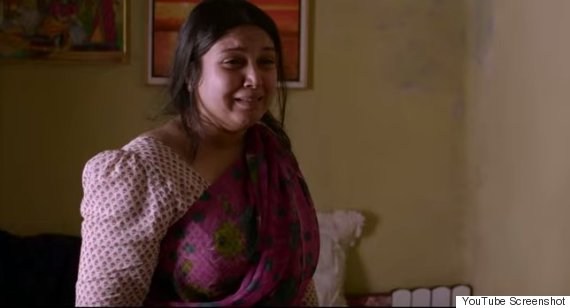
Bhumi Pednekar in Dum Laga Ke Haisha.
Yashraj Films released its little-hyped Dum Laga Ki Haisha. Sharat Katariya's film broke new ground in mainstream Bollywood by writing a story around a plump woman - a size Bollywood had traditionally reserved for the heroine's simpleton friend, or for the badly-dressed woman who pines for the hero and hence is supposed to be comical or the reviling aunt. Fat was and continues to be synonymous with funny and the audience is urged to laugh at the 'fat woman's' basic urges - like dressing up, eating, or crushing on a guy.
However, Bhumi Pednekar embraced her character Sandhya's weight with such grace that she could be easily the most real woman character we have seen in ages in Bollywood. Pednekar and her character showed how average people with a few extra kilos actually live - with a great deal of confidence and a degree of dismissiveness about his/her body. Pednekar's Sandhya embodied that peace we have forged with our far-from-perfect bodies. She even showed how criticism against one's body need not be tolerated, never mind who it is from. Sandhya's character - reticent at times and mildly rebellious at others - is played wonderfully by newcomer Pednekar.
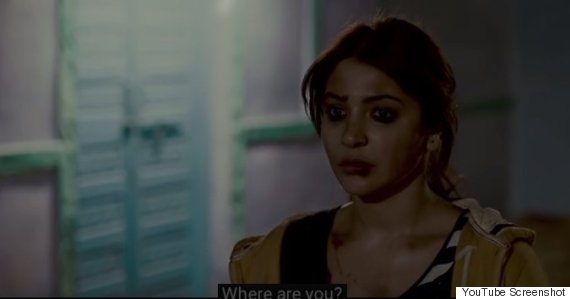
Anushka Sharma in NH10.
Next came Anushka Sharma's NH10, a film she had produced. Sharma's film was raw and violent. Violence has been a mainstay in Bollywood films but women have been at the receiving end of it mostly to facilitate heroics from the leading man. Sharma's character Meera reacts to violence like one of us would - starting with fear, then desperation followed by blinding rage. Sharma, considered one of the most convincing actresses we have in the industry, essayed Meera's transformation with heart-aching accuracy. You could feel Meera anger on your fingertips and her pain as a growing lump in your throat.
Two films, that could have easily been written off as arthouse, actually managed to grab eyeballs after their release. One was Shonali Bose's Margarita, With A Straw, which had Kalki Koechlin playing Laila, the protagonist with autism. Though the film didn't exactly set the cash register ringing, it was one of the most important films of our times. Given how ill-equipped as a culture we are to deal with disability - off and on screen - Margarita, With A Straw is a thoughtful portrayal of people with autism. In fact, it managed to shock conservative cine-goers by its accurate portrayal of such an individual's sexuality and the challenges involved in leading a sexually satisfying life. And a major part of the credit for making the film look real went to Koechlin who delivered a restrained performance while playing a character which can look easily overwrought.
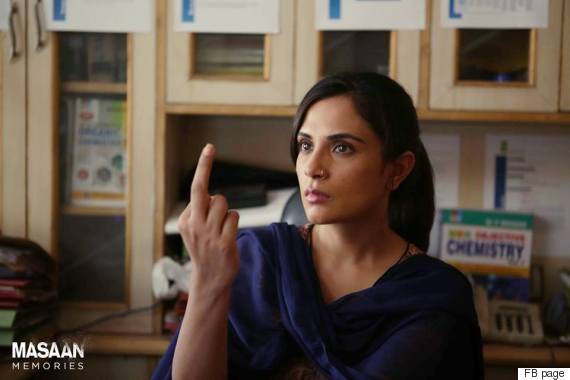
Richa Chadha.
Neeraj Ghaywan's Masaan was one of the most memorable films of the year. And Richa Chaddha, who plays Devi, rightly walked away with all the accolades. Devi, a young woman who goes through a series of harrowing experiences that would break anyone, seems to possess a sense of equanimity.
Also, Devi is one of the few women characters written in Indian films who don't treat their sexuality as a shame, like most women. In the scene where Devi meets her paramour in a hotel, the sexual tension in the room could be cut with a knife. The protagonists, hesitate, teeter and finally embrace desire in the most awkward, real way. Devi grabs her lover's hands and places them on her breast, a far cry from how the industry is accustomed to portraying foreplay.
Devi is also a victim of patriarchy but she seems to have chosen to rise above it by just being herself, pursuing her dreams. It's difficult to like Devi, probably because we are conditioned to seeing a certain amount of vulnerability in our victims. Devi almost flinches away from showing any form of tenderness even to her valiant father who sticks by her through everything. However, the filmmaker ensures that as a survivor, she commands our utmost respect.
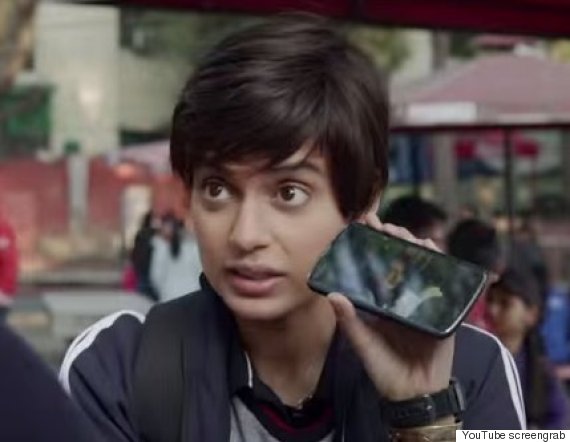
Kangana Ranaut in Tanu Weds Manu Returns.
The throbbing excitement that preceded the release of Tanu Weds Manu Returns in May this year came with a reassuring message - that Indian audiences were finally warming up to the idea of a woman being the central character of the film. Bollywood potboilers which exist to sing paeans for the brave, macho Indian male have over the years conditioned film goers to seek out films starring a highly-billed male actor. Kangana Ranaut managed to breach that sacred space reserved for the Bollywood hero with Tanu Weds Manu Returns. Ranaut played the roles of a tomboyish Kusum and a dramatic, overtly feminine Tanu in the film. From her pitch-perfect Haryanvi accent to her comic timing, from her chameleon-like agility as she swapped characters to how she wholeheartedly embraced the oddities of Kusum and Tanu in the film, Ranaut was worth every paisa of the ticket price. In fact, with Tanu Weds Manu Returns, the idea that a 'Kangana Ranaut film' is worth investing in, has dug its heels in the conscience of the average Bollywood film-goer.
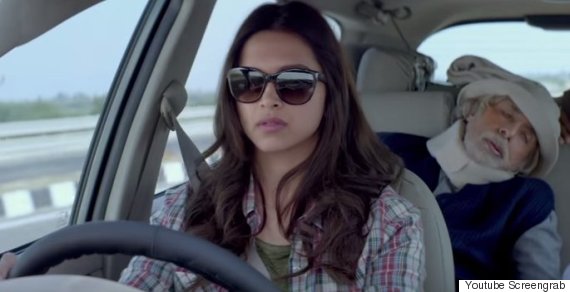
Deepika Padukone in Piku.
Vying for the same space in the Bollywood film lover's life is Deepika Padukone. The actor - who has come an unbelievably long way since her wooden Om Shanti Om days - had a fabulous year, with author-backed roles to boot. Shoojit Sircar's Piku, which released in May this year, was a testimony to Padukone's eye for nuance as she made a complicated, layered character her own. Piku was a bit of you, a bit of me, bits of many, many people you know. From vacillating between deep resentment and anxious affection for an ageing parent, to looking away from the gaping blanks in her life, Piku was so real that she was almost heartbreaking. And the credit goes entirely to Padukone.
In Tamasha, Padukone managed to lend coherence to the character of Tara - a girl who is disappointed, but cannot fall out of love. Tara's dichotomy - her love for Ved (Ranbir Kapoor) and her inability to embrace the man as he is - is played out by Padukone with coherence and confidence. The year concluded with Padukone playing Mastani in Sanjay Leela Bhansali's Bajirao Mastani. Overtly dramatic, like most of Bhansali characters, Padukone still managed to lend Mastani a semblance of realism.
 Like Us On Facebook |
Like Us On Facebook |  Follow Us On Twitter |
Follow Us On Twitter | Also see on HuffPost: